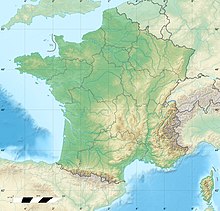
Back Seeschlacht bei der Île de Groix German Groix’n taistelu Finnish Bataille de Groix French Groix-i csata Hungarian Battaglia di Groix Italian グロワ島の海戦 Japanese Bitwa pod Groix Polish Бой у острова Груа Russian Битка код Гроа Serbian
| Battle of Groix | |||||||
|---|---|---|---|---|---|---|---|
| Part of the naval operations during the War of the First Coalition | |||||||
 View of the Close of the Action Between the British and French Fleets, off Port L'Orient on 23 June 1795, Robert Dodd | |||||||
| |||||||
| Belligerents | |||||||
|
|
| ||||||
| Commanders and leaders | |||||||
|
|
| ||||||
| Strength | |||||||
| 14 ships of the line (OOB) | 12 ships of the line (OOB) | ||||||
| Casualties and losses | |||||||
| 144 killed and wounded |
670 killed and wounded 3 ships of the line captured | ||||||
Location within France | |||||||
The Battle of Groix ([ɡʁwa], g'r-wah) was a large naval engagement which took place near the island of Groix off the Biscay coast of Brittany on 23 June 1795 (5 messidor an III) during the French Revolutionary Wars. The battle was fought between elements of the British Channel Fleet and the French Atlantic Fleet, which were cruising in the region on separate missions. The British fleet, commanded by Admiral Lord Bridport, was covering an invasion convoy carrying a French Royalist army to invade Quiberon, while the French under Vice-admiral Villaret de Joyeuse had sailed a week earlier to rescue a French convoy from attack by a British squadron. The French fleet had driven off the British squadron in a battle on 17 June known as Cornwallis's Retreat, and were attempting to return to their base at Brest when Bridport's force of 14 ships of the line appeared on 22 June.
Villaret, believing that the stronger British fleet would destroy his own 12 ships of the line, ordered his force to fall back to the inshore anchorage off Groix, hoping to take shelter in protected coastal waters. Several of his ships were too slow, falling behind so that early in the morning of 23 June the rearmost ships of his fleet were caught by the British vanguard, overhauled one by one and brought to battle. Although Villaret fought a determined rearguard action, three French ships were captured, all with very heavy casualties, and the remainder of the French fleet was left scattered across miles of coastline. In this position they were highly vulnerable to continued British attack, but after only a few hours' engagement, concerned that his ships might be wrecked on the rocky coastline, Bridport called off the action and allowed Villaret to regroup inshore and retreat to Lorient.
Although the battle was a British victory, there was criticism of Bridport's rapid withdrawal. British historians have subsequently considered that a unique opportunity to destroy the French Atlantic fleet had been lost. The invasion at Quiberon ended in disaster a month later, although Bridport remained at sea in the region until September. The French fleet by contrast was trapped in the port of Lorient where food supplies ran out, forcing Villaret to discharge many of his ships' crews. As a result, most ships did not return to Brest until the winter and were consequently unable to threaten British control of the French coastline for the remainder of the year. Several French captains were court-martialled following the battle, with two dismissed from the Navy for disobeying orders.
